
Este blogue é destinado aos estudantes, professores e os interessados em aprender um pouco de Língua Estrangeira Moderna, o Inglês.
Translate
domingo, 8 de setembro de 2013
sábado, 7 de setembro de 2013
VERB TO BE - SIMPLE PAST
Verbo to be, no passado, utiliza 2 conjugações, was e were. O was é usado para a primeira e terceira pessoas do singular (I, he/she/it), e o were é usado para as restantes:
Affirmative form (forma afirmativa)
Use a forma was para I, he, she, it e were para as demais pessoas:
I was (eu era ,eu estava)
you were ( você era ,você estava)
he was (ele era ,ele estava)
she was (ela era, ela estava)
it was (ele(a) era, ele(a) estava)
we were (nós éramos, nós estávamos)
you were (vocês eram, vocês estavam )
they were (eles(as) eram ,eles(as) estavam)
Negative form
Usam-se as formas negativas wasn’t (was not) para I, he, she, it e weren’t( were not) para as demais pessoas.
I wasn’t
you weren’t
he wasn’t
she wasn’t
it wasn’t
we weren’t
you weren’t
they weren’t
Interrogative form
As perguntas se formam com a anteposição do verbo to be ao sujeito:
was I …?
were you…?
was he…?
was she…?
was it…?
were we…?
were you…?
were they…?
Exemplos:
Where were you? (Onde você estava?)
Was she home?(Ela estava em casa?)
He wasn’t there. (Ele não estava lá.)
When I was a child, I was very naughty.(Quando eu era criança, eu era muito levado.)
You were happy. (Você estava feliz.)
Were you at the party? ( Você estava na festa? )
Yes, I was.(Sim, estava.)
No, I wasn’t. (Não, não estava).
NOTE: O passado de are é were e o passado de is é was. O passado de am é was também.
segunda-feira, 2 de setembro de 2013
The History of the Line Dance Boot Scootin Boogie
"Boot Scootin' Boogie," an original country line dance created in 1990--and sometimes called simply "Boot Scoot Boogie"--has a special place in line dance history. It is one of the first signature country line dance songs created specifically around a song title.
Other People Are Reading
Other Names for Boot Scootin' Boogie
- Originally choreographed by Vancouver-based line dance choreographer Bill Bader, the original history of the line dance "Boot Scootin' Boogie" has its roots in Canada. The dance is sometimes referred to as "Vancouver Boot Scootin' Boogie." Other cities have claimed it as their own, putting their own regional variations on the original dance. As one of the world's most popular beginner line dances, "Boot Scoot Boogie" is also known as the "Calgary Boogie," "Montreal Shuffle," "Philadelphia Special" and "Missouri Boot Scoot."
Orginal Signature Song Asleep at the Wheel
- Most of the time, "Boot Scootin' Boogie" or "Boot Scoot Boogie" is danced to the Brooks & Dunn version of the song. Originally written by Ronnie Dunn, it was an album cut recorded by Asleep at the Wheel that inspired Bill Bader to write the line dance.
- World's Largest Line Dance
- Line dances like the "Electric Slide" and "Cupid Shuffle" have been used to break the official Guinness World Record for the World's Largest Line Dance. But from 1996 to 2001, line dancers in Tamworth, Australia for six consecutive years set and defended their Guinness World Record for the World's Largest Line Dance, with "Boot Scootin' Boogie" referred to by Aussies as "Boot Scoot Boogie."
Other Bill Bader World Record Line Dances
- Surpassing his "Boot Scootin' Boogie" record, Bader has the international distinction of having a second Guinness World Record line dance, when over 12,000 dancers in Singapore performed the "Singapore Sling."
Boot Scootin' Boogie Choreographer Bill Bader
- Bader first got bitten with the line dancing bug back in the 1970s, with disco line dances like the hustle. Since then, he has been teaching line dancing around the world.
more: http://www.ehow.com/facts_5497844_history-dance-boot-scootin-boogie.html#ixzz2dn9oit6c
quinta-feira, 29 de agosto de 2013
domingo, 25 de agosto de 2013
sábado, 24 de agosto de 2013
Present Simple Tense Action Verbs Interactive Monkey Game
Practice Present Simple Grammar and Sentences with this ESL Vocabulary and Grammar Interactive Monkey Fun Game for Beginners (sings, listens, etc). ESL Learners and Teachers can use it to review English vocabulary and grammar or simply practice these words. The present simple tense is often used for habitual or regular actions. We often use time expressions like ‘Everyday, every morning, often, usually’ being used with the present simple tense.
There are images and in some cases audio in these types of games. Drag and drop the words into the correct spaces to complete the sentence. After that, click SUBMIT. If you are correct, the monkey will get a banana.
More Games
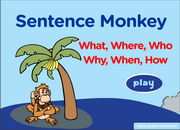
Question Words – What, where, Who, why, when, which, how, Grammar Activity
Practice Question Words – What, where, Who, why, when,...
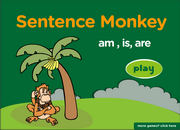
Verb – to be- Auxiliary Verb, am, is, are, ESL Grammar Activity
Practice the auxiliary ‘to be’ in the present simple...
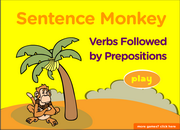
Verbs Followed by Prepositions, ESL Grammar Activity Online
Practice Verbs Followed by Prepositions, using this ESL Grammar...
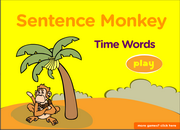
Learn words and expressions of time, ESL Grammar Activity
Learn words and expressions of time, (day, week, year, month,...
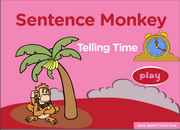
Time, Daily Routines Expressions, ESL Grammar Sentence Activity
Practice the Telling the time, using this ESL Grammar Interactive...
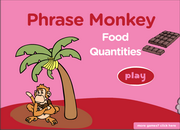
Food Partitives, Expressions of Quantity, a slice of, a piece of, ESL Grammar Activity
Practice Expressions of Quantity with this Food Partitives...
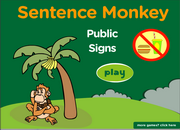
Public Signs, Imperative Form and Sentences ESL Grammar Activity Online
Practice the Imperative Forms and learn to talk about public...
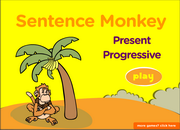
Present Progressive Tense Use, Continuous, ESL Grammar Fun Game Online
Practice the Present Progressive Tense, using this ESL Grammar...
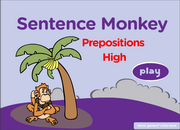
Prepositions Review ESL Grammar Activity Online
Review Prepositions, using this ESL Grammar Interactive Monkey...
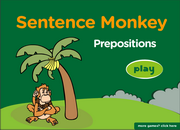
Prepositions of Place ESL Fun Game Online, Grammar Practice
Practice the Prepositions of Place, using this ESL Grammar Interactive...
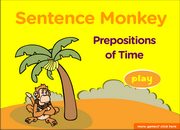
Prepositions of Time, ESL Grammar Interactive Game
Practice the Prepositions of Time, using this ESL Grammar Interactive...
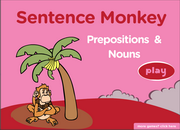
Prepositions Nouns Collocations, by hand, on foot, by chance, ESL Fun Game Online
Practice the Prepositions and Nouns Collocations, using this...
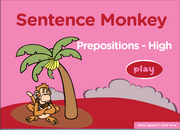
Prepositions,to,of, for, since, with, in, by, ESL Grammar Fun Activity
Practice the Prepositions, using this ESL Grammar Interactive...
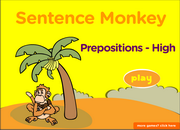
Prepositions, for, since, with, in, by, ESL Grammar Fun Game
Practice the Prepositions, using this ESL Grammar Interactive...
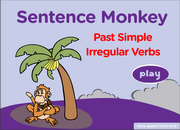
Past Simple, Irregular Verbs, ESL Grammar Interactive Activity Online
Practice the Past Simple Tense and Irregular Verbs, using this...
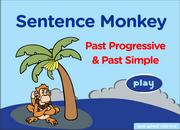
Past Progressive, Past Continuous, Past Simple, Verb Tenses, ESL Grammar Interactive Activity
Practice the Past Progressive or Past Continuous and Past Simple...
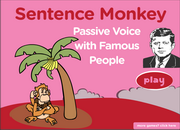
Passive Voice, Past Passive, ESL Grammar Sentence Activity Fun Game Online
Practice the Passive Voice Past Passive Famous People , using...
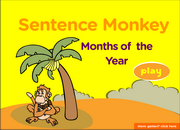
Months and Ordinal Numbers ESL Vocabulary Game Activity Online
Practice Months of the year and Ordinal Numbers with this ESL...

Modal Verb ‘Should’, ‘Shouldn’t’ for Giving Advice on Health Problems, ESL Grammar Activity
Practice Sentences with the modal verb ‘should‘ and...
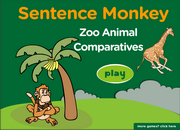
Comparatives, Superlatives, Wild, Zoo Animals Vocabulary, Grammar, Interactive Monkey Fun Activity
Review Comparatives and Superlatives with Vocabulary from Wild...
http://www.eslgamesplus.com/present-simple-tense-action-verbs-interactive-monkey-game/
There are images and in some cases audio in these types of games. Drag and drop the words into the correct spaces to complete the sentence. After that, click SUBMIT. If you are correct, the monkey will get a banana.
More Games

Question Words – What, where, Who, why, when, which, how, Grammar Activity
Practice Question Words – What, where, Who, why, when,...

Verb – to be- Auxiliary Verb, am, is, are, ESL Grammar Activity
Practice the auxiliary ‘to be’ in the present simple...

Verbs Followed by Prepositions, ESL Grammar Activity Online
Practice Verbs Followed by Prepositions, using this ESL Grammar...

Learn words and expressions of time, ESL Grammar Activity
Learn words and expressions of time, (day, week, year, month,...

Time, Daily Routines Expressions, ESL Grammar Sentence Activity
Practice the Telling the time, using this ESL Grammar Interactive...

Food Partitives, Expressions of Quantity, a slice of, a piece of, ESL Grammar Activity
Practice Expressions of Quantity with this Food Partitives...

Public Signs, Imperative Form and Sentences ESL Grammar Activity Online
Practice the Imperative Forms and learn to talk about public...

Present Progressive Tense Use, Continuous, ESL Grammar Fun Game Online
Practice the Present Progressive Tense, using this ESL Grammar...

Prepositions Review ESL Grammar Activity Online
Review Prepositions, using this ESL Grammar Interactive Monkey...

Prepositions of Place ESL Fun Game Online, Grammar Practice
Practice the Prepositions of Place, using this ESL Grammar Interactive...

Prepositions of Time, ESL Grammar Interactive Game
Practice the Prepositions of Time, using this ESL Grammar Interactive...

Prepositions Nouns Collocations, by hand, on foot, by chance, ESL Fun Game Online
Practice the Prepositions and Nouns Collocations, using this...

Prepositions,to,of, for, since, with, in, by, ESL Grammar Fun Activity
Practice the Prepositions, using this ESL Grammar Interactive...

Prepositions, for, since, with, in, by, ESL Grammar Fun Game
Practice the Prepositions, using this ESL Grammar Interactive...

Past Simple, Irregular Verbs, ESL Grammar Interactive Activity Online
Practice the Past Simple Tense and Irregular Verbs, using this...

Past Progressive, Past Continuous, Past Simple, Verb Tenses, ESL Grammar Interactive Activity
Practice the Past Progressive or Past Continuous and Past Simple...

Passive Voice, Past Passive, ESL Grammar Sentence Activity Fun Game Online
Practice the Passive Voice Past Passive Famous People , using...

Months and Ordinal Numbers ESL Vocabulary Game Activity Online
Practice Months of the year and Ordinal Numbers with this ESL...

Modal Verb ‘Should’, ‘Shouldn’t’ for Giving Advice on Health Problems, ESL Grammar Activity
Practice Sentences with the modal verb ‘should‘ and...

Comparatives, Superlatives, Wild, Zoo Animals Vocabulary, Grammar, Interactive Monkey Fun Activity
Review Comparatives and Superlatives with Vocabulary from Wild...
http://www.eslgamesplus.com/present-simple-tense-action-verbs-interactive-monkey-game/
sexta-feira, 23 de agosto de 2013
Simple Present: DO e DOES
O DO e DOES são verbos auxiliares. Mas, prá que eles servem? Eles servem pra indicar em que tempo uma determinada conversa , por exemplo está acontecendo.
O DO E DOES são utilizados nas frases interrogativas para indicar que uma determinada ação está no tempo presente. Então observe os exemplos:
DO you study English every day? ( Você estuda Inglês todos os dias? ) Yes, I do // No,I don´t (= do not )
DOES she work on Saturdays? ( Ela Trabalha aos sábados? ) Yes, she does // No, shedoesn´t ( = does not )
DO they like romantic movies? ( Eles gostam de filmes românticos ? )Yes, they do // No, they don´t ( = do not )
DOES he know my name? ( Ele sabe meu nome ? ) Yes, he does // No, he doesn´t ( does not )
Where DOES she live? ( Onde ela mora ? ) She liveS in São Paulo.
Why DO you buy so many flowers? ( Por que você compra tantas flores ? ) Because Ilove flowers.
Através dos exemplos acima, conclua:
O Do é um verbo auxiliar que indica presente, ações que expressam rotina e é usado para sujeitos que NÃO são 3a. pessoa do singular em sentenças interrogativas e negativas, acrescido do ” not ” ( = don´t )
O Does é um verbo auxiliar que indica presente,ações que expressam rotina e é usado para sujeitos que SÃO 3a. pessoa do singular em sentenças interrogativas e negativas , acrescido do ” not ” ( = doesn´t )
Nas respostas do tipo Yes/No, observe que você apenas precisa inverter o verbo auxiliar e osujeito
Nas respostas completas, quando afirmativas, nada muda, mas não se esqueça de colocar umS no verbo para indicar a 3a. pessoa do singular.
Para as sentenças completas negativas, observe os exemplos abaixo:
I don´t study English. // I don`t love flowers.
He doesn´t study English. // She doesn´t live in São Paulo.
Notou? Nas negativas, assim como nas interrogativas ,o verbo auxiliar aparece,então não se põe o S no verbos para a 3a. pessoa do singular.
quinta-feira, 22 de agosto de 2013
domingo, 18 de agosto de 2013
Games
Teacher Mafalda's Blog: Games: Jogos Interativos- Jogos mais Populares. Vocabulares Games http://gamestolearnenglish.com/ http://www.digitaldialects.com/Englis...
segunda-feira, 12 de agosto de 2013
Present Perfect
Lembrem-se que ele se chama Present Perfect por uma razão: tem sempre algo relacionado com o presente de quem fala ou da situação da qual se fala. Comecemos com alguns exemplos:
- I have lost my car keys. (Perdi as chaves do meu carro. Não estou com elas agora, portanto não posso entrar no carro.)
- Have you done your homework? (Fizeram a tarefa? – Pergunta a professora querendo ver a tarefa feita agora.)
- I have broken a glass. (Quebrei um copo. Há cacos de vidro por todos os lugares.)
- Why can´t John buy that new car? – He has lost his job. (Por que John não pode comprar aquele carro novo? – Ele perdeu seu emprego. Agora não tem dinheiro para comprar o carro.)
Viram a conexão entre o passado e o presente?
Let´s continue …
O Present Perfect também é usado com uma série de advérbios:
- JUST: indica que a ação acabou de acontecer. He has just finished doing his homework. (Ele acabou de terminar de fazer sua tarefa.)
- EVER: alguma vez na vida. Have you ever gone hiking in the mountains? (Você já foi fazer trilha nas montanhas?)
- ALREADY: já (nas frases afirmativas). I have already been to China. (Eu já estive na China.)
- NEVER: nunca. I have never seen such a beautiful thing. (Nunca vi coisa tão Linda.)
- YET: 1. já (quando se espera que a resposta seja afirmativa) – Have you done the dishes yet? (Já lavou a louça? – Era esperado que você a lavasse.) – 2. ainda (em frases negativas) – No, I haven´t done the dishes yet. (Não, não lavei a louça ainda.)
- SINCE – desde. I have been a teacher since 1992. (Sou professor desde 1992.)
- FOR – há, por, faz. I haven´t seen him for a long time. (Não o vejo há/por/faz muito tempo.)
Mais Dicas Importantes
- Quando a pergunta contiver WHEN nunca use o Present Perfect, sempre use o Simple Past: When did you start studying English?
- O Present Perfect também é usado para indicar a quantidade de vezes que a pessoa faz algo. Por exemplo: This is the first time I´ve come here. (É a primeira vez que venho aqui.) – She hasn´t been here lately. (Ela não tem vindo aqui ultimamente.)
domingo, 11 de agosto de 2013
Question Words
WHO
WHAT
WHEN
WHERE
HOW
HOW OFTEN
HOW MANY
Who (quem) – é uma palavra usada como o sujeito da oração.
Exemplos: Who is that beautiful girl? (Quem é aquela moça bonita?)
Who likes soccer? (Quem gosta de futebol?)
Who was playing to you? (Quem estava brincando com você?)
What(o que, que)
Exemplos: What did you say? (O que você disse?)
What should I do? (O que eu deveria fazer?)
When (quando)
Exemplos: When were you born? (Quando você nasceu?)
When did he go? (Quando ele saiu?)
Where (onde)
Exemplos: Where is Mary? (Onde está Mary?)
Where was Daniel last week? (Onde estava Daniel semana passada?)
Where are the toys and objects? (Onde estão os brinquedos e objetos?)
How (como)
Exemplos: How do you usually go to work? (Como você faz habitualmente para ir ao trabalho?)
How’s your family? (Como vai sua família?)
How often ( com que frequência)
Exemplos: How often do you play soccer? (Com que frequência você joga futebol?)
How often do you go out with your friends? (Com que frequência você sai com seus amigos?)
How many (quantos/as)
How many students are there in your classroom? (Quantos alunos há na sua sala de aula?)
How many months are in the year? (Quantos meses há no ano?)
Adverbs of frequency
always, usually, regularly, normally, often, sometimes, occasionally, rarely, seldom, never are adverbs of frequency.
The position of these adverbs is:
before the main verb
| Adverb of frequency | Verb | |||
|---|---|---|---|---|
| I | always | get up | at 6.45. | |
| Peter | can | usually | play | football on Sundays. |
| Mandy | has | sometimes | got | lots of homework. |
after a form of to be am, are, is (was, were)
| Verb | Adverb of frequency | ||
|---|---|---|---|
| Susan | is | never | late. |
The adverbs often, usually, sometimes and occasionally can go at the beginning of a sentence.
Sometimes I go swimming.
Often we surf the internet.
Sometimes I go swimming.
Often we surf the internet.
Somtimes these adverbs are put at the end of the sentence.
We read books occasionally.
We read books occasionally.
6 th grade - Answer key

Text: What do teens do in their free time? page 60
Exercises page 61 - Answer-key
1. c
b
e
a
d
2. a) Barb
b) Toshio
c) Diana
d) Roger
3. Respostas pessoais
Ex.: In my free time I usually watch TV................use the computer. ...............go out with my friends. and etc.
4. Food for tought.... (algo para se pensar)
"Teens have lots of things to do every day." (Adolescentes tem muitas coisas para fazer todo dia?)
How are their lives affected by that? (Coo as vidas deles são afetadas por isto?)
Do they have time to play? (Eles têm tempo para brincar?)
Do they have time to talk to their families? (Eles têm tempo para conversar com os familiares deles?)
quarta-feira, 7 de agosto de 2013
Assinar:
Postagens (Atom)






